
2023
National
Trade Survey

Working for business.
Working for Australia
Telephone 02 6270 8000 | Email [email protected] | Website www.acci.com.au
Media Enquiries
Telephone 02 6270 8020 | Email [email protected]
Canberra Office
Commerce House
Level 3, 24 Brisbane Avenue
Barton ACT 2600
PO BOX 6005
Kingston ACT 2604
Melbourne Office
Level 3, 150 Collins Street
Melbourne VIC 3000
Perth Office
Bishops See
Level 5, 235 St Georges Terrace
Perth WA 6000
ABN 85 008 391 795
© Australian Chamber of Commerce and Industry 2023
This work is copyright. No part of this publication may be reproduced or used in any way without acknowledgement to the Australian
Chamber of Commerce and Industry.
Disclaimers & Acknowledgements
The Australian Chamber of Commerce and Industry (ACCI) has taken reasonable care in publishing the information contained in this
publication but does not guarantee that the information is complete, accurate or current. In particular, ACCI is not responsible for the
accuracy of information that has been provided by other parties. The information in this publication is not intended to be used as the
basis for making any investment decision and must not be relied upon as investment advice. To the maximum extent permitted by law,
ACCI disclaims all liability (including liability in negligence) to any person arising out of use or reliance on the information contained in
this publication including for loss or damage which you or anyone else might suffer as a result of that use or reliance.

4
5
6
8
10
12
13
14
16
18
Contents
03
About
Foreword
Company profile
Key trade markets
Managing international market risks
Trade challenges
Trade administration
Trade support services
Trade agreements
ACCI's recommendations
Barriers to starting importing or exporting
7
Where do business get information about new international trade opportunities
16
16
17
17
15
ACCI 2023 National Trade Survey
Goods traders - experiences obtaining trading documents
Goods and services traders - experiences with trade administration organisations
Impact of trade agreements for business
Usefulness of existing trade agreements
Support for current Australian Government trade negotiations
Trade negotiation priorities
13
13
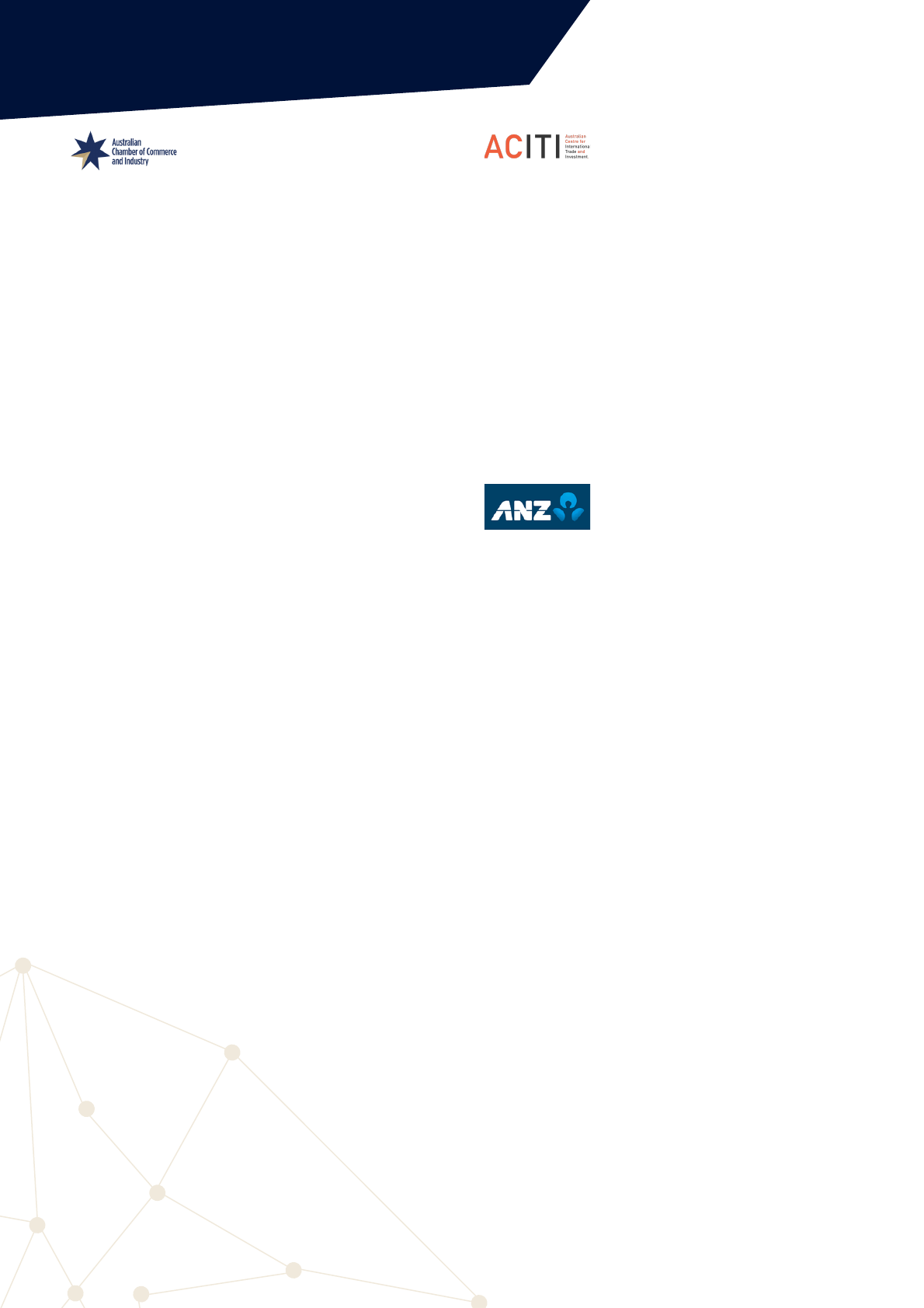
Australian Chamber of Commerce and
Industry (ACCI)
04
Australian Centre for International Trade
and Investment (ACITI)
ANZ provides world-class banking solutions for
which we are highly awarded. We aim to be the
best bank in the world for customers driven by
regional trade and capital flows; providing support
to local and global businesses looking to connect
with growth opportunities across Asia Pacific and
beyond.
We help our customers capitalise on the
movement of money and goods across the region
by leveraging our extensive network of banking
specialists and experts spanning 30+ markets
around the world, including an on-the-ground
presence in 13 markets across Asia.
Our banking solutions are tailored to suit your
needs on a local, regional or global level. We
harness the power of innovation and technology
to bring you fast, secure and world-class digital
platforms. Bank with us and you’ll be partnered
with a dedicated ANZ relationship team that will
connect you to our thought leaders and banking
specialists across ANZ.
About
The Australian Chamber of Commerce and
Industry represents hundreds of thousands of
businesses in every state and territory, and across
all industries. Ranging from small and medium
enterprises to the largest companies, our network
employs millions of people. In all, ACCI represents
more than 400,000 businesses in its network.
We also bring the voice of Australian business to
the international forums where policies are made,
as the exclusive Australian partner of the
International Chamber of Commerce, Business at
OECD, the International Organisation of
Employers and regional organisations across the
Indo-Pacific.
ACCI strives to make Australia the best place in
the world to do business – so that Australians
have the jobs, living standards and opportunities
to which they aspire.
We seek to create an environment in which
businesspeople, employees and independent
contractors can achieve their potential as part of a
dynamic private sector. We encourage
entrepreneurship and innovation to achieve
prosperity, economic growth and jobs.
We focus on issues that impact on business,
including economics, trade, workplace relations,
work health and safety, and employment,
education and training.
We advocate for Australian business in public
debate and to policy decision-makers, including
ministers, shadow ministers, other members of
parliament, ministerial policy advisers, public
servants, regulators and other national agencies.
We represent the broad interests of the private
sector rather than individual clients or a narrow
sectional interest.
The Australian Centre for International Trade and
Investment is an independent not-for-profit,
nonpartisan organisation. It is dedicated to
advancing Australia's international economic
engagement by facilitating access to information,
fostering networks across business, government,
academe and civil society, and conducting and
promoting research and analysis on trade and
investment issues of national importance.
ANZ

Andrew McKellar
Chief Executive Officer, ACCI
Foreword
05
The Australian Centre for International Trade and
Investment (ACITI) is pleased to partner with ACCI
in delivering the sixth National Trade Survey.
The survey was undertaken as Australia’s trading
businesses confront the ongoing fall out of the
economic impacts of COVID-19 measures, high
inflation and rising interest rates, tight labour
markets, supply chains yet to find a new normal,
war in Ukraine, emissions reduction measures,
major transitions in energy markets, and ongoing
geostrategic tensions between the United States
and China.
The standout finding from ACCI’s sixth National
Trade Survey is the ingenuity and perseverance of
Australia’s trading businesses in navigating the
challenges thrown at them over the past three
and a half years. While government and industry
association support helped, the unique
operations of each business required them to
innovate and adapt as circumstances changed.
Australian trading businesses proved themselves
adept at managing risks and uncertainty.
The 2023 National Trade Survey reflects the views
of a representative sample of small, medium and
large businesses, from all of Australia’s states and
territories. It includes the views of goods and
services trading businesses from all of the major
traded sectors.
This year’s survey reinforced a number of findings
from earlier surveys but also includes new
findings that show trading businesses responding
and adapting to the new international trade
environment.
ACCI is the voice of Australian business, both in
Australia and internationally.
In addition to our deep connection to Australian
businesses in every state and territory and across
the Australian economy, ACCI brings the voice of
Australian business through our partnerships
with the International Chamber of Commerce,
Business at OECD, the International Organisation
of Employers and regional organisations across
the Indo-Pacific.
This year’s National Trade Survey – the sixth ACCI
has conducted – makes for interesting reading for
business, policy-makers and all Australians.
In these challenging times, it has never been
more important to have a read on what is
happening in the real economy. Our network
provides an unrivalled view of these issues.
For the first time, this year’s survey asked
specifically about how firms are managing their
international market risk.
While some findings are new – such as the shift
towards the United States as a priority market for
respondents – other findings confirm the reality
we know instinctively: Australia’s businesses are
dynamic, adaptive and proactive in seeking to
manage the particular headwinds in their
industries.
But it also reveals that there is more that can be
done to make the most of Australia’s trading eco-
system. ACCI will be a constructive voice for
business to make the most of these
opportunities. In that spirit, this document sets
out five broad themes we can work together on.
Lastly, we thank ANZ for their support in making
this project possible. ANZ is a partner for
Australian businesses right throughout the
economy, and a fitting partner for ACCI in
bringing the voice of Australian business to life
through this project.
Dr Prudence Gordon
Executive Director, ACITI
ACCI 2023 National Trade Survey
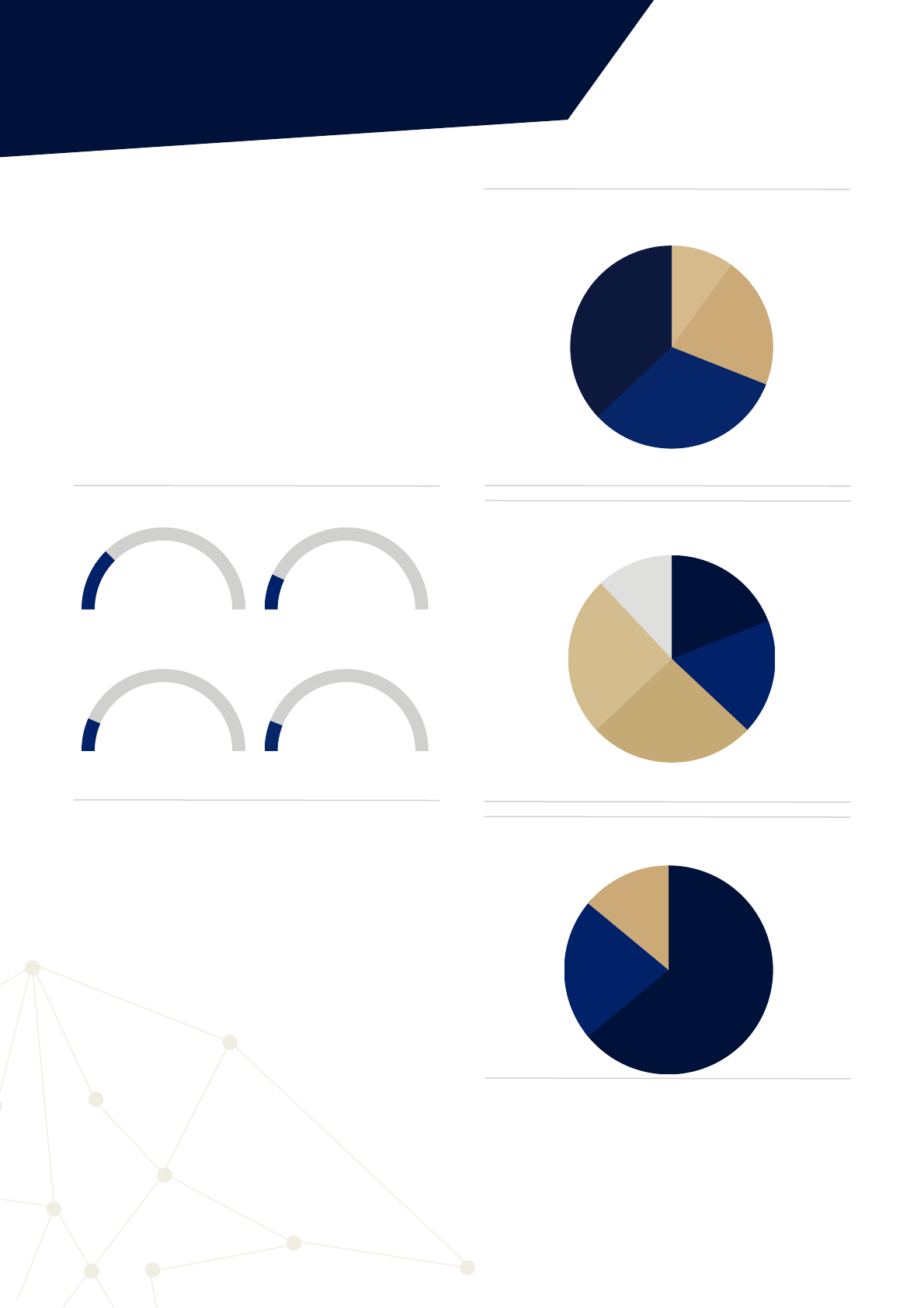
06
20 to 199
37%
5 to 19
32%
1 to 4
21%
200 or more
10%
$2m to $10m
26%
$10m to $100m
25%
< $500,000
19%
$500,000 to $2m
18%
> $100m
12%
Goods
64%
Services
22%
Goods and services
14%
Company profile
ACCI’s 2023 National Trade Survey presents the
perspectives and concerns of a broad cross-
section of Australian international trading
businesses. It represents the views of small,
medium and large businesses, from all Australian
states and territories, and across goods and
services businesses in all major traded sectors.
The survey was completed by 154 companies and
follow-up qualitative interviews were conducted
with 10 of those companies.
Company size by number of employees
Company size by turnover (AUD)
Types of product traded
25% 14%
13% 12%
Manufacturing Agriculture
Wholesale trade
Professional services
Retail trade, construction, tourism, mining,
transport, postal and warehousing,
accommodation and food services, financial
services, education and training, legal or dispute
resolution services, information media and
telecommunications, administrative and support
services, and arts and recreation services are also
reflected in the data.
Sectors

07
Barriers to starting importing or exporting
This year, the survey sought information from companies that either had engaged in trade before but
were no longer trading internationally and those that had never traded, to gain insights on key barriers
to going global. Fifteen per cent of respondents fall within this category.
Major reasons provided by these businesses are:
State or territory of primary operations
VIC
23%
NSW
21%
QLD
19%
WA
13%
ACT
8%
TAS
7%
SA
6%
NT
3%
How businesses engage in international trade
We don't have enough information on how to trade in
international markets
Estimated returns do not justify the investment
The business is profitable enough without needing to
access international markets
The business tried to import/export and found it too
difficult
International trade is too risky
I’ve avoided getting into export just
because of all the heartache and pain
that goes along with that … the quality
assurance, compliance, the regulations,
any of those sort of problems, we just
don’t have the bandwidth to deal with
that sort of stuff.
Small manufacturer, South East Queensland
For some, the challenges of international trade
were perceived to be too great.
ACCI 2023 National Trade Survey
Export
34%
Import
7%
Export and
import
27%
Neither
export nor
import
15%
Ancillary
support services
17%
38%
33%
19%
5%
5%
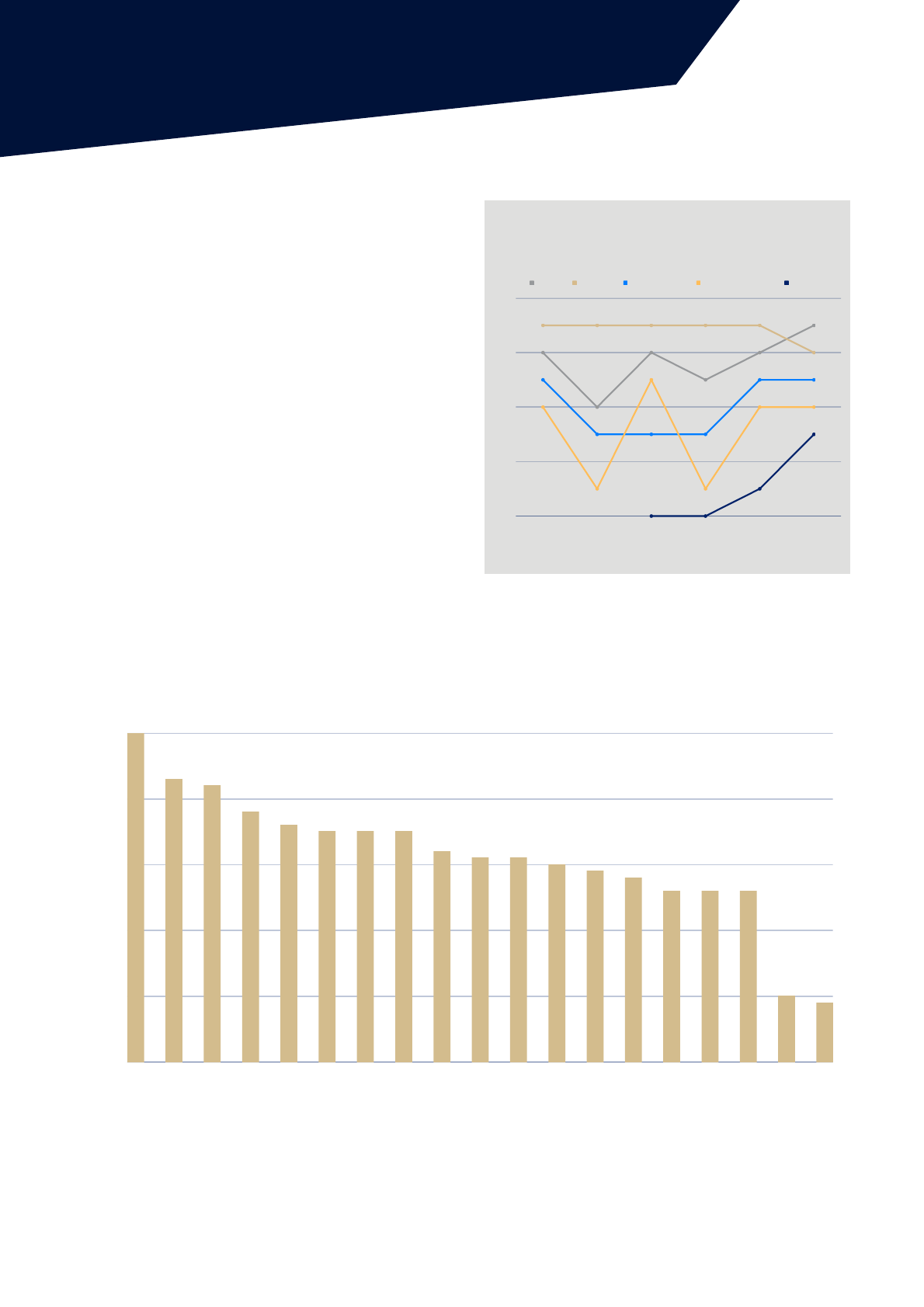
USA
China
Singapore
New Zealand
UAE
Japan
UK
Malaysia
India
Taiwan
Thailand
Hong Kong
Vietnam
Germany
South Korea
Indonesia
Canada
Mexico
Brazil
50%
40%
30%
20%
10%
0%
USA China Singapore New Zealand UAE
2014 2015 2016 2018 2021 2023
8
6
4
2
0
The survey asked respondents to list all markets
with which they trade.
For the first time, the United States has outstripped
China as the most common trade market for survey
respondents.
China topped the list in all previous National
Trade Surveys.
The fall in China’s ranking is noteworthy
considering China’s imposition of trade barriers in
2020 on a number of Australian exports including
barley, wine, coal, lobster and beef.
08
Key trade markets
Major markets in 2023
50
43
42
38
36
35
35 35
32
31
31
30
29
28
26
26
26
10
9
Ranking of markets over time
Ranking
0
2
4
6
8

09
ACCI 2023 National Trade Survey
Image
ACCI’s longitudinal data demonstrates the long-
term consistency in Australian key trade markets.
This data confirms that Australia’s trade relations
extend significantly beyond its current and
prospective Free Trade Agreement partners, including
in the Middle East, South Asia, Africa and South
America.
In addition to the 19 economies included in the
survey as options as export markets and/or
import sources, other markets listed by
respondents include: Argentina, Bahrain,
Bangladesh, Belgium, Brunei, Democratic
Republic of the Congo, Denmark, Egypt, Ethiopia,
Fiji, Finland, France, Guinea, Ghana, Italy, Iran,
Ireland, Jordan, Kiribati, Kuwait, Lebanon, Mali,
Mongolia, Morocco, Netherlands, New Caledonia,
Papua New Guinea, Pakistan, Peru, Philippines,
Qatar, Saudi Arabia, Spain, Solomon Islands, Sri
Lanka, Sweden, Switzerland, Tanzania, Trinidad
and Tobago, Turkey, Vanuatu and Yemen.
This diversity of trade markets, while indicative
only, reinforces the finding below that market
diversification was the most used strategy for
managing international market risk.
This breadth of Australian trade interests
potentially explains why the update and reform of
World Trade Organization agreements was the
most commonly selected top negotiation priority
for government according to survey respondents.
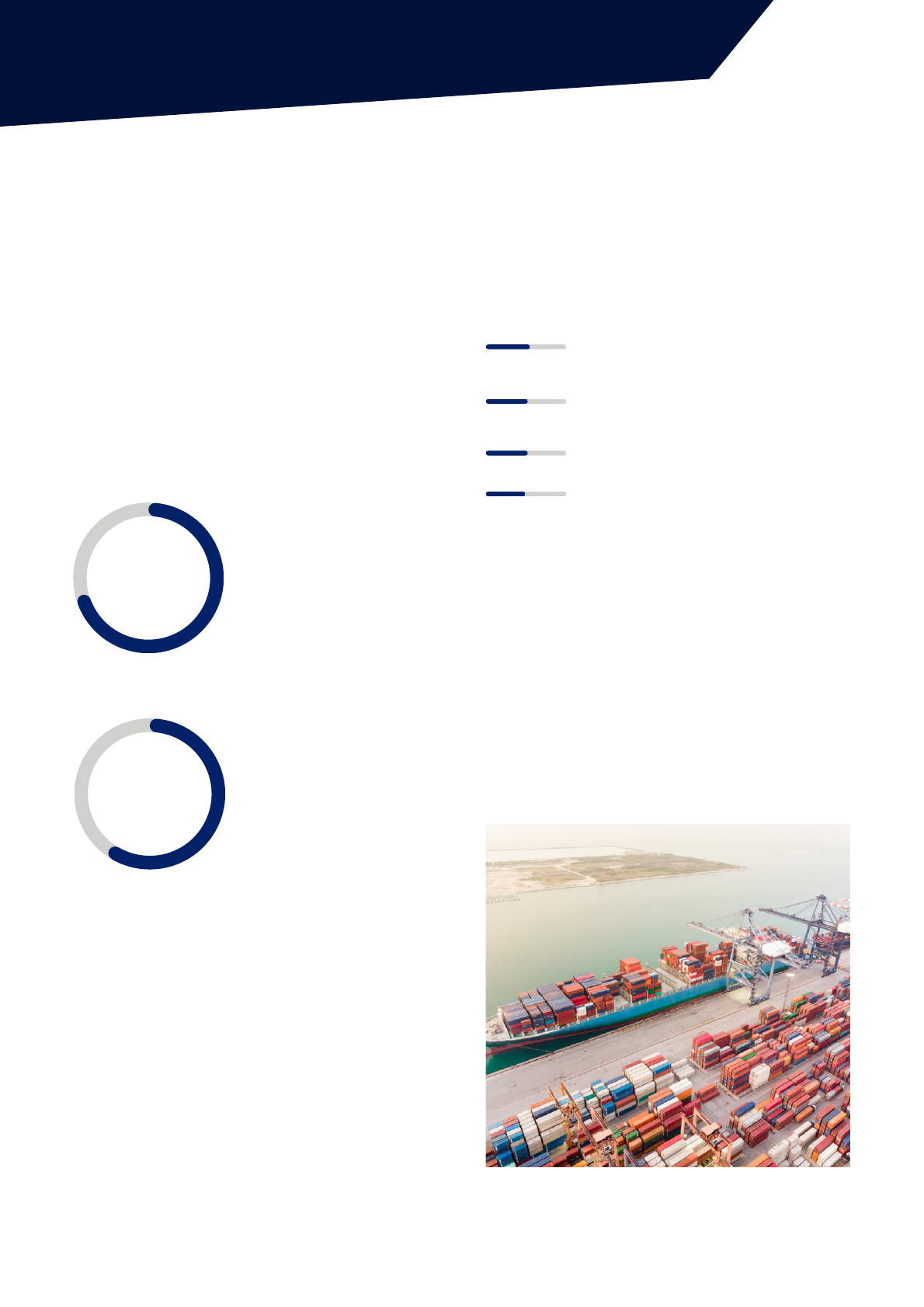
71%
60%
55%
52%
52%
49%
Image
This year’s survey included new questions seeking
insights on how trading businesses managed
international market and supply chain risks. These
questions were posed in light of the uncertainty
and disruption caused by COVID-19 measures,
geopolitical tensions and Chinese trade barriers,
and the real and potential impact of carbon
emissions reduction measures.
Geopolitical tensions and market diversification are
front of mind for Australian trade businesses.
Asked how concerned respondents were by the
need to diversify markets, geopolitical tensions
and proposed carbon border adjustment
mechanisms.
Managing international market risks
Fewer respondents identified preparing for
carbon border adjustment mechanisms as a
major or moderate concern (38 per cent). This will
be worth monitoring in future surveys. It may be
that this is a less pressing concern prior to the
European Union's CBAM entering into effect.
identified the need to diversify
markets as either a major
concern or moderate concern.
identified geopolitical
tensions as either a major
concern or moderate concern.
The survey suggests that Australian trading
businesses are proactive in seeking new customers
and markets to help manage international market
risk.
In response to the question of what measures
businesses are adopting to manage their
international market risk:
10
These findings suggest Australian trading
companies are highly active in seeking new
customers and markets to help manage
international market risk.
Other options adopted by trading businesses to
manage risk included expanding to direct to
consumer online sales, part paying the freight on
trial export shipments, covering the cost of
shipping in order to attract new buyers and
increased scrutiny of contract wording.
of respondents had increased marketing
in new international markets.
had increased marketing in existing
international markets.
had increased sales in Australia.
said they had developed new products
to help manage international market
risk.

A lot of our customers are going through like a
‘once bitten twice shy’. So many of them are
looking at onshoring. We’re seeing a lot more
projects that customers are willing to wear a
higher cost if they can guarantee local supply.
While Australian trade businesses are adaptive, their
options to adapt are often more constrained.
Options for managing the risks of supply chain
disruptions were more limited with 29 per cent of
respondents having no options for managing
international shipping and logistics supply chain
risks. The most used option was simply to pay
more for the services that were available.
Other options for managing supply chain
disruption noted by respondents included
sourcing inputs via the retail market at sometimes
double the price of normal supplies, and setting
up production and manufacturing facilities in the
destination market.
Small manufacturer, South East Queensland
0% 20% 40% 60%
Paid more to secure supply chain services
Found alternative supply chain services
Moved to supply/source from Australian customers/suppliers
None - no alternatives were available
Other
Managing international shipping and logistics-related supply chain risks
11
ACCI 2023 National Trade Survey
51
43
34
29
9

Minor concern No concern Moderate concern Major concern
-80% -60% -40% -20% 0% 20% 40% 60% 80%
Exchange rate too low
Migration levy
Subsidies for competitors
Commercial disputes
Corruption in international markets
Exchange rate too high
Intellectual Property disputes
Enforcing contracts
Skilled migration
Market entry/access
Progress on free trade agreements
Ability to service international markets
Red tape
New product development
Skills shortage
International competitiveness
Past National Trade Surveys have provided
valuable information on the key challenges facing
Australian trading businesses.
Between 2014 and 2021, international
competitiveness was the principal trade concern
identified. The 2023 survey identified skills
shortages as the most significant major concern,
but international competitiveness was again
identified as the issue causing both major and
moderate concern for both goods and services
trading businesses.
International competitiveness remains the most
common concern of Australian trade businesses, but
skills shortages are most often cited as a major
concern.
Trade challenges
Key trade concerns impacting trading businesses - goods and services
Specifically for businesses trading in goods, supply
chain issues are the most common significant
concern, with 90 per cent of survey respondents
ranking shipping and logistics as a major or
moderate concern.
Customs and border crossing costs are the second
most cited concern (67 per cent), with non-tariff
barriers and tariffs on imports and exports also
identified as significant concerns.
The challenges of transporting goods across border
are well known, with the Simplified Trade System
Implementation Taskforce established to address
such barriers. At present, regulations that impact
cross-border goods movements are administered by
more than 28 federal government agencies.
12
Challenges for goods businesses
No concern Minor concern

Trade administration
Goods traders – experiences obtaining trading documents
Trade documentation assists traders to access the benefits of trade agreements, enables passage of products
across borders and provide assurance about product quality. This survey asked respondents for experiences
in obtaining trade documentation and associated services. Owing to the diversity of products and their trade
documentation needs, the level of engagement varies considerably. Certificates of origin were ranked the
highest in terms of user experience, both under free trade agreements and for markets without them.
Z
Goods and services traders - Experiences with trade administration organisations
Respondents in both goods and services categories were also asked to rate their experience with a list of
government and non-government organisations providing trade administration services. Of those listed,
traders rated shipping and logistics companies most highly, ahead of government agencies.
13
ACCI 2023 National Trade Survey
-75% -50% -25% 0% 25% 50% 75%
Shipping and logistics companies
Department of Foreign Affairs and Trade
Department of Home Affairs (border protection/customs)
Courier companies
Australia Post
Department of Agriculture, Fisheries and Forestry
Department of Home Affairs (immigration)
-100% -75% -50% -25% 0% 25% 50%
Non-preferential Certificates of Origin
Trade agreement Certificates of Origin
Incoterms 2022
Pre-shipment Inspection Certificate
Department of Agriculture (AQIS) certificates
Certificates of Free Sale
Health certificates
Home Affairs
Non-tariff barriers
Consular legalisation / endorsement
Halal certificates
N/A
Poor Average Good
Excellent
ExcellentGoodAveragePoorN/A

Sometimes Often Always Rarely Never
-100% -75% -50% -25% 0% 25% 50% 75%
Chambers of commerce or industry associations
Austrade's Export Market Development Grants (EMDG) scheme
State government trade promotion agency
Austrade's trade missions
Austrade's digital services (export.business.gov.au)
Austrade's in-market Tailored Services
TradeStart program
DFAT 'Business Envoy' publication
EFA (formerly EFIC) trade finance products
14
Sometimes Often AlwaysRarely
Trade support services
Use of trade support services
Australian governments at the federal, state and
territory level, industry associations and
commercial providers invest significant resources
in supporting Australian businesses to identify
and capitalise on international trade
opportunities.
A key component of the National Trade Survey
has been to provide an indicator of the uptake
and value of these services for Australian
business.
Never
All past National Trade Surveys highlighted the large
number of respondents who never employed
government trade support services. The 2023 survey
reinforces this finding.
Use of trade support services
Between 57 and 77 per cent of respondents
indicated they never used federal government
trade support services. Forty-nine per cent
indicated they never used state and territory
government trade support services. Fifty-four per
cent of respondents said they sometimes, often
or always used trade support services provided
by chambers of commerce or industry
associations.
This finding would suggest there is scope to
amplify government investment in trade support
services to business by working more closely with
chambers of commerce and industry
associations.
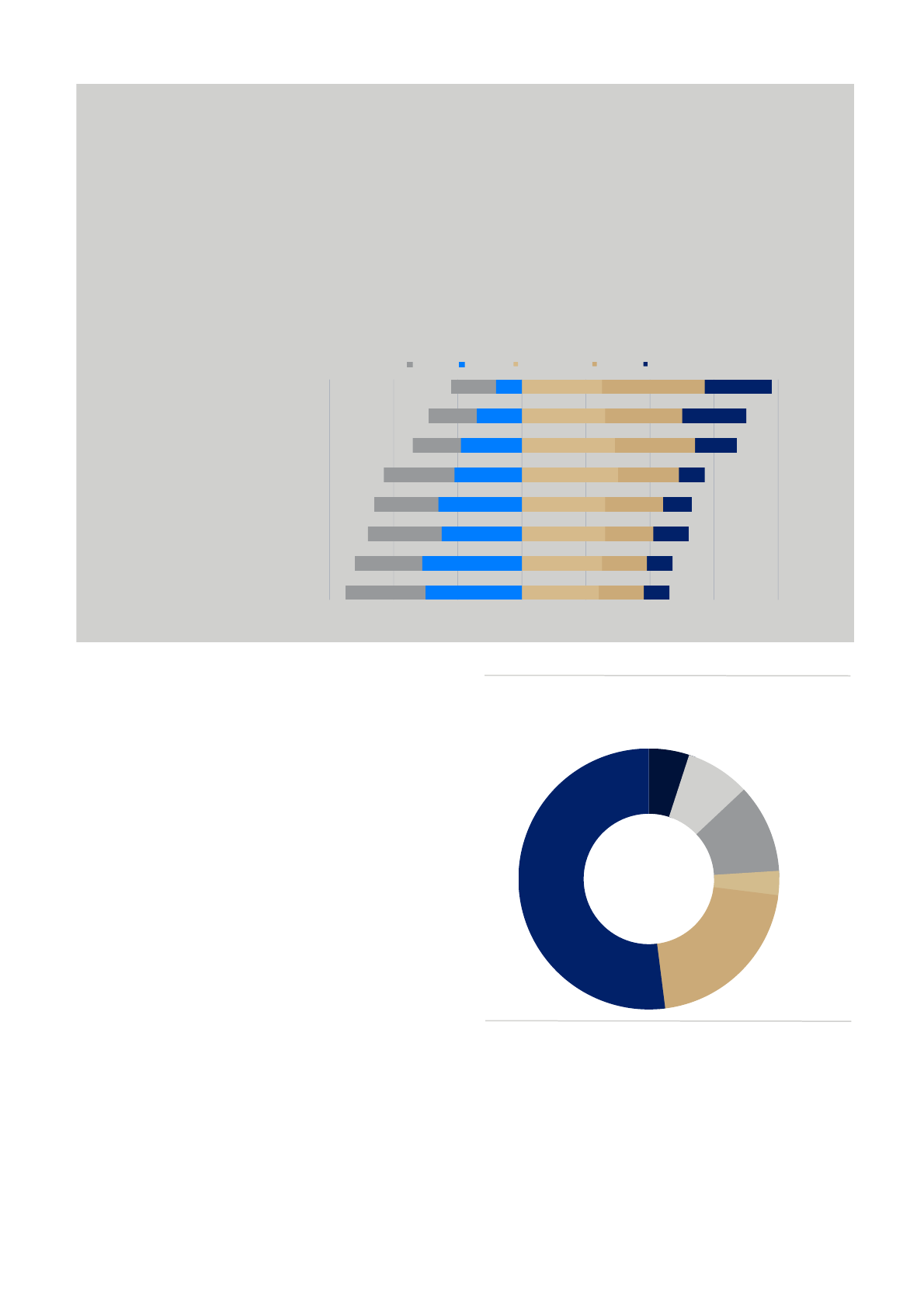
N/A
52%
Neither easy nor difficult
21%
Easy
11%
Difficult
8%
Very difficult
5%
Very easy
3%
Never Rarely Sometimes Often Always
-60% -40% -20% 0% 20% 40% 60% 80%
Online
Private market visits
Industry associations
Austrade
State government agencies
Chambers of commerce
Newspapers/professional publications
Participating in trade missions
Ease of accessing trade finance
Sources of information on new international trade opportunities
Businesses draw upon a range of information sources when gathering market intelligence and
considering potential trade opportunities.
The findings suggest that businesses pursue new opportunities independently or with the
assistance of sector-specific information. Online resources remain the most commonly used
sources of information, with self-directed private market visits outranking participation in
government-arranged trade missions.
Where do businesses get information about new international trade opporunities?
15
ACCI 2023 National Trade Survey
Use of trade finance products
Specific trade finance products exist to finance
transactions and to assist businesses to manage
risks in their trading environment, particularly
when entering new and unfamiliar markets.
Relative to business loans, trade finance products
can provide access to cheaper debt, the ability to
finance a larger proportion of the overall
transaction and to free up business loans for
other operational or productive investments.
Notwithstanding business concerns about the
current international market risks demonstrated
in this survey. A majority of respondents to this
survey continue to consider trade finance
products inapplicable to their business.
This suggests that business loans continue to be
used instead and may indicate a knowledge gap
about the uses of trade finance products.

Trade agreements
Trade agreements assist business in multiple
ways. These include reducing and/or removing
tariffs and quotas and removing, simplifying or
harmonising trade administration and services
trade regulations. Trade agreements can increase
the accessibility of information on trade-related
regulations and processes, and establish
processes for resolving trade disputes.
The National Trade Survey provides a useful
indication of the value placed on trade
agreements by Australian trading businesses. A
consistent finding across the previous five
National Trade Surveys is that trade agreements
are not well understood by businesses but they
are keen to better understand them.
Impact of trade agreements for
business
Respondents were asked about the perceived
impact of trade agreements in terms of improved
market access, operational savings and increased
ability to employ.
The 2023 survey indicates wide variability in the
value placed on trade agreements by business. In
terms of the overall impact of Australia’s current
trade agreements on business, rated from 1
(lowest impact) to 5 (highest impact), with
respondents relatively evenly spread between the
5 rankings from lowest to highest impact.
16
-80% -60% -40% -20% 0% 20% 40% 60% 80%
Peru-Australia FTA
Australia-Chile FTA
Pacific Agreement on Closer Economic Relations (PACER)
Regional Comprehensive Economic Partnership Agreement
Australia-Singapore Digital Economy Agreement
Australia-Singapore Green Economy Agreement
Comprehensive and Progressive Agreement for Trans-Pacific Partnership
WTO Agreements
Australia-India Economic Cooperation and Trade Agreement
Indonesia-Australia Comprehensive Economic Partnership Agreement
Australia-New Zealand Closer Economic Relations Trade Agreement
Singapore-Australia FTA
Australia-Hong Kong FTA
Malaysia-Australia FTA
Australia-United States FTA
Japan-Australia Economic Partnership Agreement
Korea-Australia FTA
Thailand- Australia FTA
ASEAN-Australia-New Zealand FTA
China-Australia FTA
Usefulness of existing trade agreements
Usefulness of existing agreements
Reinforcing the findings of previous years, this
National Trade Survey finds that a large number
of respondents have either never heard of specific
trade agreements or do not find them useful.
In this category, the Peru-Australia Free Trade
Agreement ranks lowest with 41 per cent of
respondents having never heard of the agreement
and 35 per cent not finding it useful. In contrast,
63 per cent found the China-Australia Free Trade
Agreement either slightly (17 per cent), somewhat
(15 per cent) or very (31 per cent) useful.
The survey confirms that the perceived usefulness
of agreements broadly aligns with Australia’s
trade patterns. However, it suggests that
understanding of the usefulness of large
multilateral trade agreements – such as the
Regional Comprehensive Economic Partnership
(RCEP) and the Comprehensive and Progressive
Agreement for Trans-Pacific Partnership
(CPTPP) – are lagging behind. ACCI’s own trade
agreement utilisation data confirms this finding.
The new free trade agreement with India, which
entered into force in December 2022, is showing
strong early signs of business awareness. Future
surveys will provide a stronger indication of actual
business experiences with the agreement.
Slightly useful Somewhat useful
Very useful
Not useful
Never heard of it

Support for current Australian Government trade negotiations
While understanding and awareness of trade agreements is low, and their usefulness rating variable,
respondents indicated relatively strong support for the negotiation of new trade agreements.
Australia’s current negotiations with the European Union ranked the highest with 64 per cent of
respondents indicating they were in favour of the negotiation.
Interestingly, 51 per cent of respondents were in favour of negotiations to update and reform the World
Trade Organization, a body generally poorly understood by Australian businesses.
Trade negotiation priorities
Respondents were also asked to rank 14 specific and general types of trade and investment
agreements they consider the Australian Government should prioritise.
The National Trade Survey confirms that the Australian Government’s current negotiation priorities are
aligned with those of Australian business.
Trade agreements with the European Union and the second tranche agreement with India ranked as
the first and third priorities overall.
However, it may be surprising that respondents selected update and reform of World Trade
Organization agreements as their second highest priority on average. Indeed, WTO reform and update
was the negotiation priority most often cited as respondents’ top priority. The highest negotiating
priorities not currently under negotiation by the Australian Government are with the Gulf Co-operation
Council and the United Arab Emirates.
Included for the first time in this survey were new, subject matter agreements such as green economy
and digital economy agreements. These generally rated lower and are currently less popular than
comprehensive preferential trade agreements for respondents, although this outcome is not surprising
considering the relative newness of these kinds of agreements. Future surveys will provide a useful
indication of the value of these kinds of agreements for business.
17
ACCI 2023 National Trade Survey
Support for new trade agreements
-50% -25% 0% 25% 50% 75%
Australia-European Union Free Trade Agreement
Australia-India Comprehensive Economic Cooperation Agreement
Australia-United Arab Emirates Comprehensive Economic Partnership Agreement
Update and reform of World Trade Organization agreements
Indo-Pacific Economic Framework
Australia-Gulf Cooperation Council Free Trade Agreement
No Don't know what this is Indifferent Yes

ACCI's recommendations
Take action to ease skills shortages
The 2023 National Trade Survey indicates how Australia can invest in a better trade future.
Skills shortages are the issue most often identified as a major concern for Australian trade businesses,
impacting on their ability to trade. Urgent action is needed to address chronic skills shortages.
Invest in our domestic productivity
International competitiveness is once again the top concern of Australian trading businesses. Addressing
inefficiency in our maritime shipping and logistics system, and addressing uncompetitive tax, workplace
relations and energy policy settings are vital to enhancing the position of Australian businesses in
competitive international markets.
Modernise our trade systems and reduce red tape
The Australian Government has invested heavily in the Simplified Trade System Implementation Taskforce –
we must see it deliver commercially meaningful results or risk being left behind our trading partners.
Make government support and information sources more accessible and relevant to
contemporary international market risks
The 2023 National Trade Survey shows that businesses are attuned to their need to diversify and adapt to
geopolitical tensions and supply chain disruptions. Nevertheless, the survey shows that there are
opportunities to rationalise the sources of government support so that businesses know where to access
the support they need when they need it.
Adopt a Team Australia approach to get Australia trading
Trade businesses value and trust the services they receive from chambers of commerce and industry
associations. Governments, chambers of commerce and industry associations can work together more
closely to ensure government supports and communicated effectively to trading businesses and to ensure
government advocacy meets genuine industry needs.
18
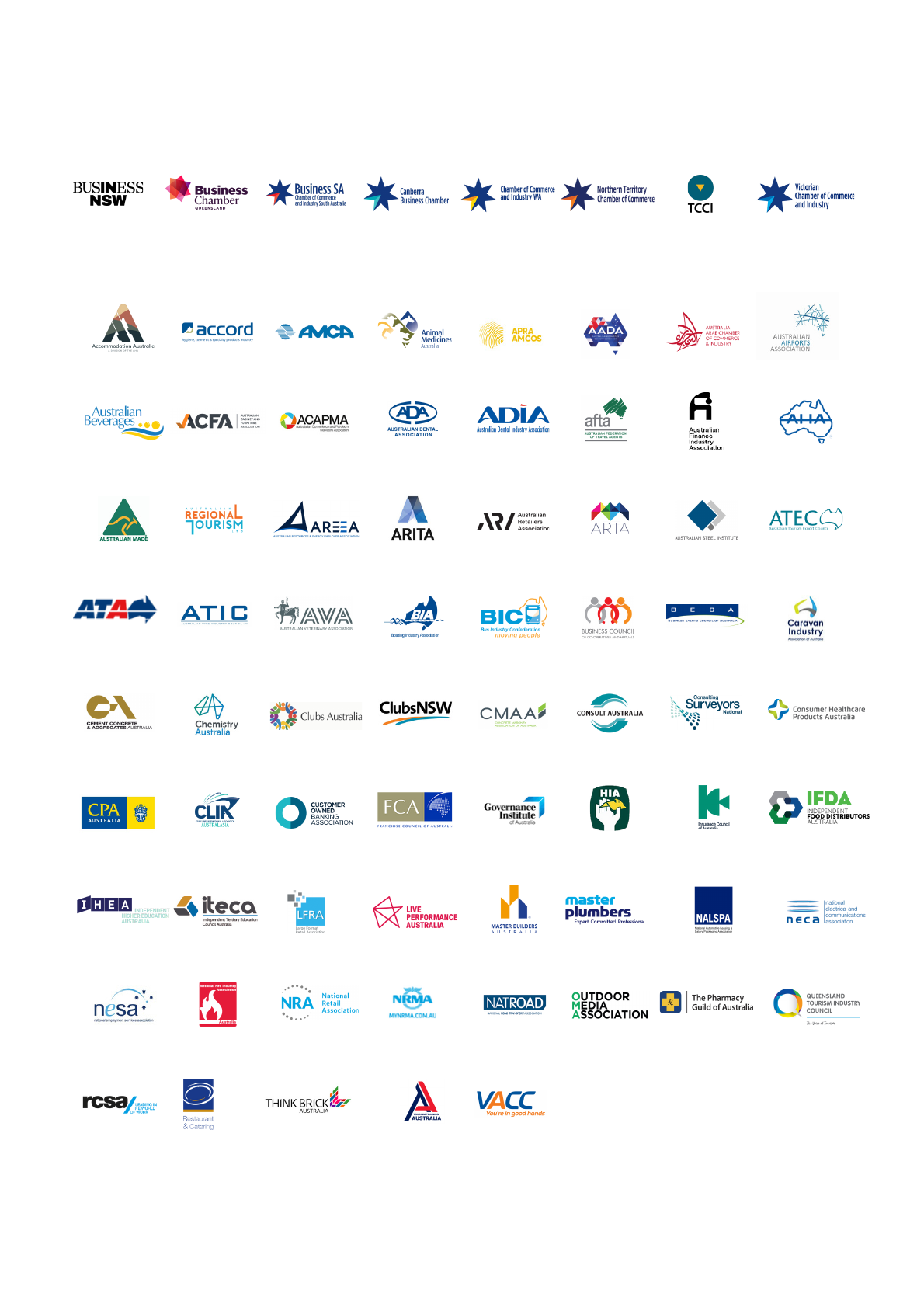
ACCI members
State and Territory Chambers
Industry Associations
19

